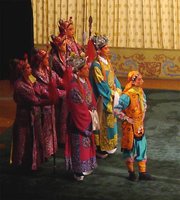Beijing opera
|
|
BejingOperaProduction.jpg
Beijing opera or Peking opera (Simplified Chinese: 京剧; Traditional Chinese: 京劇; Pinyin: Jīngjù) is a kind of Chinese Opera which arose in the mid-19th century and was extremely popular in the Qing dynasty court. It is widely regarded as the highest expression of the Chinese culture. Beijing and Tianjin are respected as the base cities of Peking Opera in the north while Shanghai is the base in the south.
| Contents |
History
BejingOperaDetailCenter.jpg
Although it is called Beijing opera, its origins are not in Beijing but in the Chinese provinces of Anhui and Hubei. Beijing opera got its two main melodies, Xipi and Erhuang, from Anhui and Hubei operas. Much dialogue is also carried out in an archaic dialect originating partially from those regions. It also absorbed music and arias from other operas and musical arts such as the historic Qinqiang. It is regarded that Beijing Opera was born when the Four Great Anhui Troupes came to Beijing in 1790. Beijing opera was originally staged for the court and came into the public later. In 1828, some famous Hubei troupes came to Beijing. They often jointly performed in the stage with Anhui troupes. The combination gradually formed Beijing opera's main melodies.
Four main roles
- Sheng (生, Male role)
- Dan (旦, Female role)
- Jing (净, Painted face male role)
- Chou (丑, Clown role)
Except the second role, the other three roles represent male characters.
There is an explanation about why the roles take the names above. It is said that they were chosen to mean oppositely. Sheng in Chinese may mean "strange" or "rare", but the chief male role is a character of well known. Dan, which means "morning" or "masculine", is the contrary of the feminine nature of the characters. Jing means "clean". But in fact, the paintings on face make the characters look like unclean but colorful. And Chou in Chinese sometime represents the animal "ox", which, in some senses, is slow and silent in contrast to Chou characters who are usually quick and talkative.
Famous artists
Four Great Dans
Repertoire
The traditional repertoire of Beijing opera includes more than 1,000 works, mostly taken from historical novels or traditional stories about civil, political and military struggles.
Modern live productions for tourists include English language displays of the text, useful for those unfamiliar with the classic stories.
See also: Zheng Yici Peking Opera Theatre
Venue
SummerPalaceOperaStageAdj.jpg
In the image at the right is a stage for the presentation of Bejing opera, built in the late 19th Century at the command of the Empress Dowager Cixi.
External links
- Peking Opera introduction on Beijing Municipal Government website (http://www.ebeijing.gov.cn/HomeBj/t20040122_101198.htm)
- Beijing Opera introduction (http://www.geocities.com/Vienna/Opera/8692/index0.html)de:Peking-Oper

